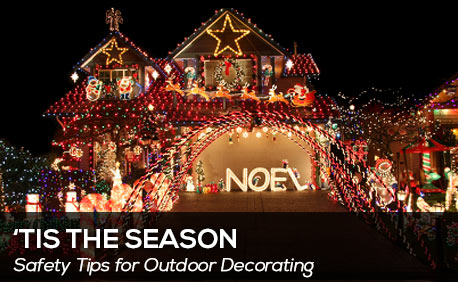Have you noticed that the Christmas season starts earlier each year? Retailers have packed away all the Halloween stuff (that appeared on shelves around Labor Day) and are now carrying quite an inventory of Christmas decorations to enhance your chances of winning the neighborhood contest to see who can have the highest electric bill for the month of December. I’ll bet you’ve already seen some displays put up by folks who always want to be first . . . or whose kids are bugging them to death to get out the inflatable Snoopy and the multicolored strobe light dancing elves.
Before you start gathering the dusty supplies left from previous years, or purchasing new ones, it’s worth repeating some safety tips for outdoor decorating. The Consumer Product Safety Commission investigates complaints of malfunctioning or dangerously designed products and has issued numerous recalls for Christmas decorations. Here are a few of the recent ones for outdoor products:
- On July 24, 2013, the Consumer Product Safety Commission (CPSC) published a recall regarding Holiday Light Bulb Sets sold by Big Lots from October 2012 to January 2013. The recalled 10-piece light sets are used to illuminate pathways or sidewalks during the Christmas holiday season. The sets contain ten 11-inch tall light stakes with a 5-inch colored bulb on each. The stakes are connected by a 15-foot long cord. The lights use plated steel conductors and have a plastic coating that is not flame retardant, which makes them a fire risk.
- On July 12, 2012, they recalled a set of 200 Mini Lights sold at Family Dollar stores in 2011 and 2012, The lights, which could be used either indoors or outdoors, presented a potential fire and electric shock hazard.
- Brookfield entry way decorating sets sold by True Value Hardware stores were recalled on December 23, 2011. The sets include two green artificial 48-inch trees in black metal vases, one green 24-inch wide wreath and one green 9-foot long garland. The wreath has battery-powered white lights. The trees and the garland plug into wall outlets. The battery box can overheat.
Indoor Christmas decorations have also undergone scrutiny and been the subject of recalls:
- On February 28, 2013, the CPSC recalled Balsam Hill pre-lit trees because the tree’s remote control receiver box overheated and melted. These were no cheapies: they sold online for between $1,250 and $3,550.
- Bethlehem Lights pre-lit trees sold exclusively by QVC were recalled on December 26, 2012, because the tree base can overheat, posing a fire hazard.
- Various resin decorations sold in Papyrus stores were recalled on December 20, 2012. They included Christmas tree ornaments and decorative home accessories. The presence of aspergillus mold spores was discovered on the products, posing a risk of respiratory or other infections in individuals with chronic health problems or who have impaired immune systems.
It’s hard to protect your home and family from danger when these items are for sale in stores you trust. How do you know what products are safe to use? First of all, check the items you already own to make sure they aren’t included in the above listed recalls. Then observe these safety tips published by the CPSC:
- Whether you’re decorating your roof or putting up a tree in the family room, make sure the lights have been tested for safety by a recognized testing laboratory, like UL; use only lights that have fused plugs.
- Check each set of lights for broken or cracked sockets, frayed wires or loose connections.
- If you have a burned-out bulb, replace it with one of the same wattage.
- Don’t use more than three sets of lights on one extension cord and make sure the extension cord was intended to carry that load.
- Make sure any lights used outdoors were certified for outdoor use.
- If the power lines in your neighborhood are not underground, be sure to stay away from the utility poles and lines feeding your home.
- Don’t use nails or tacks to attach outdoor lights to trees or your house. Hardware stores carry supplies made just for this purpose.
- Don’t leave lights on all night; turn them off if you leave the house. The lights could short out and start a fire.
- Outdoor lights should be plugged into circuits protected by ground fault circuit interrupters (GFCIs).
- When the season is over and you’re anxious to get those lights down, don’t just yank on them. They could unravel or be damaged, presenting a hazard next year.
If you own a product which you believe to be dangerous, you should report it to the CPSC. And, by all means, if you have a product-related injury you should let them know so an investigation can be made and other consumers can be protected. Go online to www.SaferProducts.gov or call CPSC’s Hotline at (800) 638-2772.
We at Louthian Law want you and your family to have a joyous holiday season, one ending in smiles as bright as the most brilliantly decked out Christmas tree. But if injuries happen because of a defectively designed or poorly manufactured product, we’ll be there to help. For more than 50 years the Louthian Law Firm has represented consumers in South Carolina who suffered because of a dangerous product. If you need us, call (803) 454-1200 for a free evaluation of your claim.
 South Carolina Lawyer Blog
South Carolina Lawyer Blog


